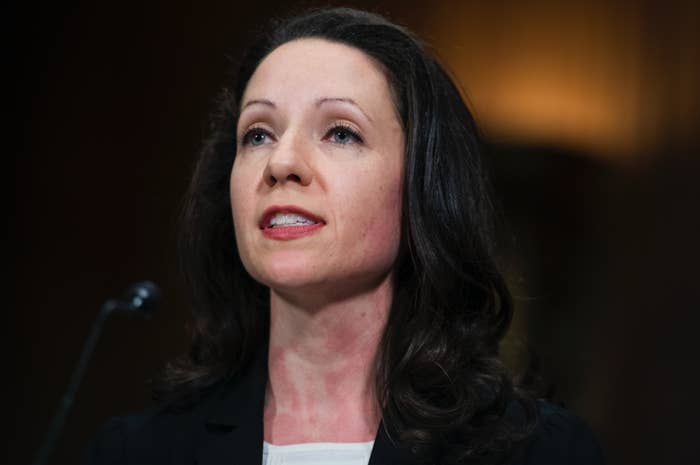
WASHINGTON — The Senate on Tuesday confirmed Washington lawyer Allison Rushing to a federal appeals court seat, making her President Donald Trump’s youngest judge to date, and the youngest federal judge in the country.
Previous presidents have put judges on the bench in their thirties, but it’s rare for appeals court judges, who have the power to set legal precedents that can only be reversed by the US Supreme Court and are more frequently tapped midcareer. Rushing, who was born in 1982, could spend decades on the US Court of Appeals for the 4th Circuit.
Concerns raised by Democrats and liberal groups about Rushing’s age and experience, as well as her conservative views and connection to the right-wing group Alliance Defending Freedom, rang hollow with Republicans. She was confirmed on a party-line vote, 53–44.
An administration official confirmed Rushing is 36. (Judges don’t publicly disclose their birthdates, only the year they were born, in nomination materials.) She earned her law degree from Duke University School of Law in 2007. Including the three years she spent clerking, Rushing has just under the 12 years of experience practicing law that the American Bar Association’s federal judiciary committee recommends for nominees. The committee rated her “qualified,” but did not give her its highest rating of “well qualified.”
At her confirmation hearing on Oct. 17, Rushing defended her experience, pointing to her work since law school practicing in federal appeals courts. She clerked for two appeals court judges and Supreme Court Justice Clarence Thomas. Republican Sen. John Kennedy pressed Rushing about whether she had “life experience,” such as working on a trial or representing clients who couldn’t pay. Rushing said she had.
No Democrat attended Rushing’s hearing — then–committee chair Chuck Grassley scheduled it while the Senate was on recess just before the midterm election, a move that angered Democrats — but they opposed her nomination. In addition to the experience issue, LGBT and civil rights groups highlighted Rushing’s criticism of the Supreme Court decision in US v. Windsor striking down the federal Defense of Marriage Act, as well as her affiliation with Alliance Defending Freedom, a group that focuses on religious freedom cases. The Southern Poverty Law Center designated Alliance Defending Freedom as a hate group for its opposition to same-sex marriage and legal protections for LGBT individuals. Rushing spent a summer in law school as a legal intern for the group, and has since spoken at events, according to her Senate questionnaire.
“Throughout her brief legal career, Alison Rushing has supported and closely associated herself with one of the most extreme anti-LGBT organizations operating in this country today, the Alliance Defending Freedom. Rather than disqualifying her from consideration, this aspect of her record seems to have made up for all of the other deficiencies in her record, including her inexperience and the lack of any connection to the state in which she will sit,” Sharon McGowan, legal director of LGBT rights group Lambda Legal, said in a statement after Rushing was confirmed.
Rushing will fill a 4th Circuit seat informally designated for a North Carolina nominee; the court also covers Maryland, Virginia, West Virginia, and South Carolina. Rushing was born in North Carolina, according to her Senate questionnaire, but now lives in Washington, DC, where she’s a partner at the law firm Williams & Connolly. She is licensed to practice in DC and Virginia — she’s not a member of the North Carolina bar — but she was admitted to practice in the 4h Circuit, where she’s handled one case, according to court records.
Although the Trump administration has prioritized younger judicial nominees who can make the most of a lifetime appointment, the average age of judges confirmed under Trump to date is 50. That’s less than Obama’s average of 51, but the same as the average age of judges confirmed under former presidents George W. Bush, Bill Clinton, Jimmy Carter, and Richard Nixon, according to Federal Judicial Center records going back to the John F. Kennedy administration reviewed by BuzzFeed News.
Of the past 11 presidents, former president George H.W. Bush had the youngest group of judges confirmed overall, with an average age of 48 (but he also only had one term in office).
While Rushing is among the youngest federal judges in recent history, she is not the youngest ever. Carter and former president Ronald Reagan put the youngest judges on the bench of the past six decades — they both nominated judges who turned 33 the year they were confirmed to US district court seats.
The Federal Judicial Center largely stopped publishing judges’ birthdays after the Carter administration, making it tricky to calculate a judge’s age the day they’re confirmed. The center does release the year judges were born, so it’s possible to at least calculate how old a judge turned the year they were confirmed. (BuzzFeed News calculated judges’ ages based on the first time they were confirmed to a federal judgeship.)
The youngest appeals court judge confirmed since Kennedy’s administration is former 9th Circuit judge Alex Kozinski, who was confirmed in 1985 and turned 35 that year. Under Reagan, four circuit judges were confirmed the year they turned 37 or earlier: Kozinski, who resigned in 2017 amid sexual misconduct allegations; 5th Circuit Judge Edith Jones; former DC Circuit judge Kenneth Starr, who left the bench to serve as US solicitor general and later led the Whitewater investigation into Clinton as independent counsel; and 7th Circuit Judge Frank Easterbrook.
Under former president Barack Obama, the youngest judge turned 39, and the youngest circuit court judge turned 42, the year they were confirmed. There were 11 judges confirmed under Obama who were either in their thirties or who turned 40 the year they were confirmed, all to district court seats. There were 14 judges who fit that criteria confirmed under W. Bush, with three going to an appeals court.
The last time the Senate confirmed a circuit court judge as young as Rushing was in 1991, when Michael Luttig was confirmed to the 4th Circuit the year he turned 37. Luttig resigned in 2006 to take a executive-level job at Boeing.

